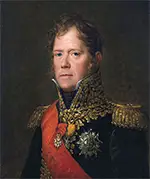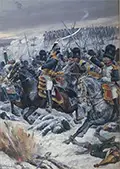French Marshal Michel Ney
Part 1: Bravery and Heroics Michel Ney was one of France's most famous commanders during the Revolutionary and Napoleonic Wars. Outspoken and controversial, he saved his country from certain defeat on several occasions but died by firing squad after a conviction on charges of treason. 
He was born on Jan. 10, 1769, in Sarrelouis, Moselle, in the Lorraine. Both French and German people lived in the region, and he grew up bilingual. His father, Pierre, was a blacksmith and a cooper (barrel maker) and had fought in the Seven Years War. Young Michel found apprenticeship with a local lawyer but more wanted to be in the military and so in 1788 he joined a regiment of the hussars, or cavalry. An excellent horseman and swordsman and seemingly unfazed by the throes of combat, he fought throughout the Revolutionary Wars and commanded troops at some of the most famous battles, including Valmy, Jemappes, and Hohenlinden. He was wounded multiple times: shot in the left shoulder during the Siege of Mainz in 1794 and shot in the hand and leg and bayoneted in the foot at Withertur in 1799. Those were the first of a series of wartime injuries. At Mannheim in 1799, he suffered a leg wound when a cannonball killed his horse from under him and then he was shot in the chest. He also had lost his horse at Giessen in 1797 and served as prisoner of Austria for a time. None of that dampened his enthusiasm for warfare, and he was one of the first marshals named by France's new head of state, Napoleon Bonaparte. Ney had met Bonaparte soon after the latter became First Consul. In 1802, Ney had married Aglaé Auguié, a friend of Bonaparte's wife, Joséphine, and her daughter, Hortense. Ney and his wife had four sons together. Also in 1802, he won a command to oversee French troops in Switzerland and helped avoid a civil war there. After Bonaparte became Emperor of the French in 1804, he reinstated the office of Marshal, and Ney was one of the first 18 to have that role. 
In 1805, with the War of the Third Coalition brewing, Ney gained command of the Ⅵ Corps of La Grande Armée. He and those soldiers earned a significant victory at Elchingen on October 14 that paved the way for the devastating encirclement at Ulm that effectively eliminated Austria from the war. Ney followed that up with an expedition to the Tyrol, seizing control of that vital region from Austria. The following year, Ney led the Ⅵ Corps into battle against Prussia in the War of the Fourth Coalition. He and his men proved too eager at the Battle of Jena, driving a wedge so far into the Prussian lines that they found themselves surrounded, and had to be rescued by a desperate gambit from a reassigned Marshal Jean Lannes. France that battle and also the one on the same day at Auerstädt. Ney led the cavalry pursuit of the retreating Prussians and occupied Erfurt and Magedburg. 
It was so late in the year that Bonaparte ordered his commanders to settle in to winter quarters and resume fighting in the spring. Ney, wanting more food and supplies for his men, disobeyed that order and the Russian forces continued the fighting. Ney and his men arrived late for the Battle of Eylau, which took place in February 1807 in a blinding snowstorm, but their arrival convinced the Russian forces to leave the field of battle. He was also present at the Battle of Friedland, a major French victory that convinced Russia to leave the war. Bonaparte sent Ney to Spain in 1808, to fight in the Peninsular War. He and his men saw firsthand the grimness of the ongoing guerrilla war there and, after one particular battle, set fire to a number of local villages in frustration. He accompanied Marshal André Masséna's Army of Portugal on an expedition against the Portuguese-U.K. force that was refusing France's intended takeover of Portugal. Ney's men captured Cuidad Rodrigo and the vaunted fortress at Almeida but retreated with the rest of the French army in spring 1811. It was at this point that Ney clashed with a fellow officer once too often. He had nearly come to blows with Marshal Jean-de-Dieu Soult several months earlier and had distrusted orders from Masséna unless the latter specified that the orders came from Bonaparte himself. Masséna had finally had enough and removed Ney from his command. The mercurial marshal made his way back to France and had time to recuperate before receiving his next command assignment. Next page > Grand Designs, Grand Defeats > Page 1, 2 |
|
Social Studies for Kids
copyright 2002–2024
David White




